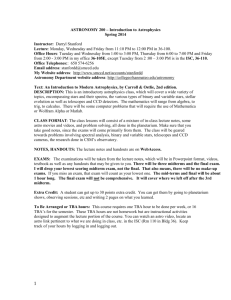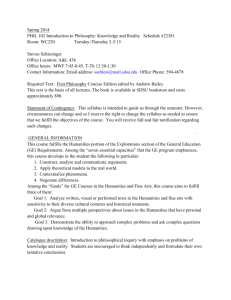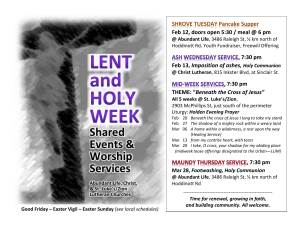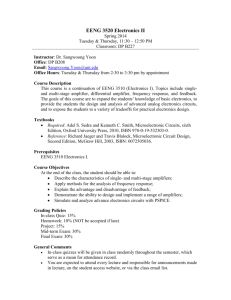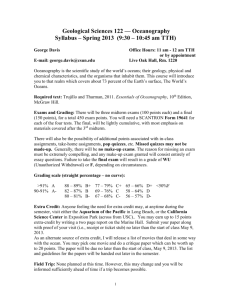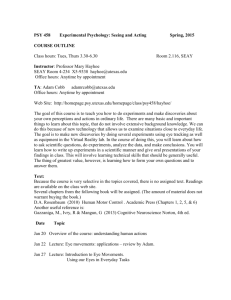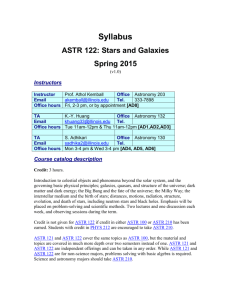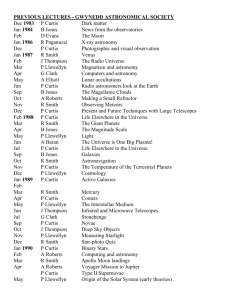Physics 108 - Introductory Astronomy
advertisement
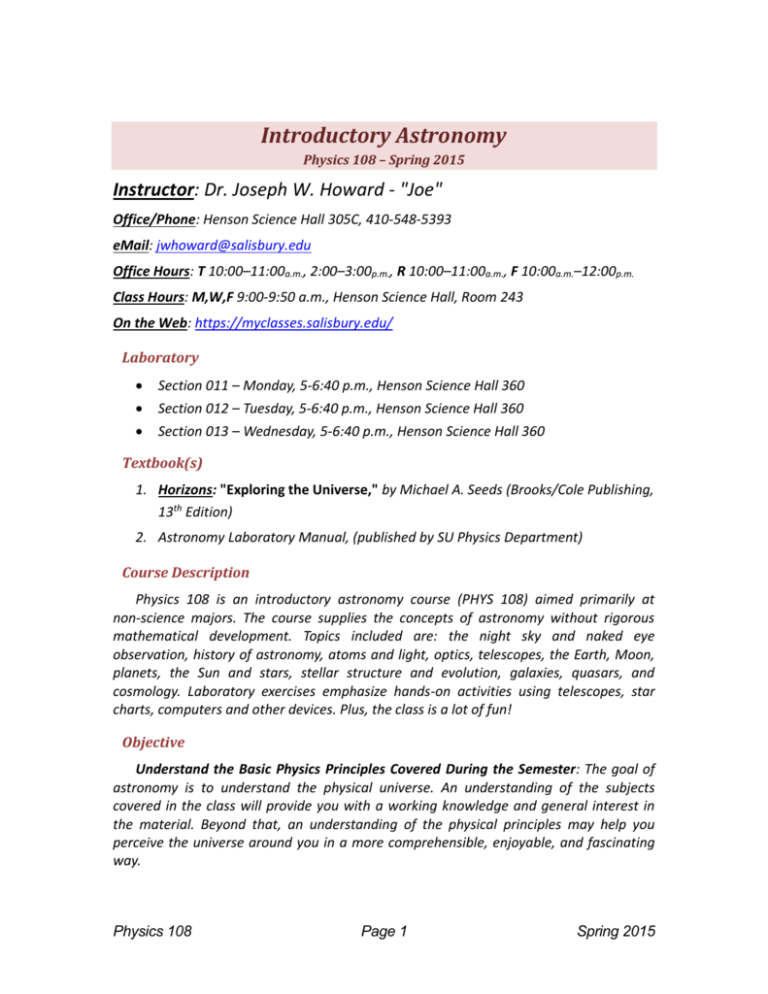
Introductory Astronomy Physics 108 – Spring 2015 Instructor: Dr. Joseph W. Howard - "Joe" Office/Phone: Henson Science Hall 305C, 410-548-5393 eMail: jwhoward@salisbury.edu Office Hours: T 10:00–11:00a.m., 2:00–3:00p.m., R 10:00–11:00a.m., F 10:00a.m.–12:00p.m. Class Hours: M,W,F 9:00-9:50 a.m., Henson Science Hall, Room 243 On the Web: https://myclasses.salisbury.edu/ Laboratory Section 011 – Monday, 5-6:40 p.m., Henson Science Hall 360 Section 012 – Tuesday, 5-6:40 p.m., Henson Science Hall 360 Section 013 – Wednesday, 5-6:40 p.m., Henson Science Hall 360 Textbook(s) 1. Horizons: "Exploring the Universe," by Michael A. Seeds (Brooks/Cole Publishing, 13th Edition) 2. Astronomy Laboratory Manual, (published by SU Physics Department) Course Description Physics 108 is an introductory astronomy course (PHYS 108) aimed primarily at non-science majors. The course supplies the concepts of astronomy without rigorous mathematical development. Topics included are: the night sky and naked eye observation, history of astronomy, atoms and light, optics, telescopes, the Earth, Moon, planets, the Sun and stars, stellar structure and evolution, galaxies, quasars, and cosmology. Laboratory exercises emphasize hands-on activities using telescopes, star charts, computers and other devices. Plus, the class is a lot of fun! Objective Understand the Basic Physics Principles Covered During the Semester: The goal of astronomy is to understand the physical universe. An understanding of the subjects covered in the class will provide you with a working knowledge and general interest in the material. Beyond that, an understanding of the physical principles may help you perceive the universe around you in a more comprehensible, enjoyable, and fascinating way. Physics 108 Page 1 Spring 2015 Policies Attendance: Attendance is required at all lecture and lab classes. You must notify the instructor in advance if you are unable to attend a lab. Cell Phones: Please turn off your cell phones (or select a silent ring) during the class lecture. You may not talk or text on the phones in the classroom during lecture. Writing Requirement: Students will be required to express themselves clearly in writing assignments given in lecture and in laboratory. Students with Disabilities: Any student in this course who has a disability that may prevent him or her from fully demonstrating his or her abilities should contact me personally as soon as possible so that we can discuss accommodations necessary to ensure full participation in this class and facilitate educational opportunities. Academic Integrity Academic integrity is at the heart of education because there is no doubt that honor and the quest for knowledge are inexorably intertwined. Salisbury University is an academic community dedicated to the achievement of intellectual growth where the pursuit of freely exchanged ideas and active study is an essential element of academic excellence and development. Students and faculty are expected to meet the highest possible standards of personal, ethical, and moral academic conduct. These standards require personal integrity, a commitment to honesty without compromise, as well as truth without equivocation. Academic trust means respecting these truths and principles, without which no university can exist. Academic Dishonesty: This instructor adheres to the policy of academic misconduct as it appears in the college catalog and outlined in the student handbook. A Word about Astronomy This is a science class and, therefore, it has similarities to all other science classes. Some students believe that if they can follow the lectures in class, then they have learned the material. This is not true. To understand astronomy, a student must do a significant amount of work outside of class thinking about, and interacting with, the course material. No one ever learns by simply reading about it or listening to someone talk about it. You learn it by making the effort to understand the material, building mental pictures, and by critically thinking about the principles learned. The standard requirement in a college class is that you spend two hours outside class working on the material for every hour in class. Since this is a four-hour class, you should plan on spending at least eight hours per week outside of class interacting with the material. Few students will be able to succeed in this class without investing that amount of time. Physics 108 Page 2 Spring 2015 Course Philosophy I want you to enjoy Physics 108 (Astronomy). The material we will be covering is fascinating and applicable. Its implications can be observed in almost everything you interact with everyday. In order to make this class as interesting and useful as possible, I will need to get feedback from you. Please feel free to ask questions in class and to come by my office during office hours. Course Structure & Assignments The course will be divided into 4 units. Each unit will be about two to four weeks long and will consist of the following graded assignments: 1. Midterm Exam or Final 2. Homework Problems A few days before each unit begins, I will distribute a detailed description of the material covered in that unit. Unit Chapters Subjects 1 1-5 The Night Sky, Early Cosmologies, Astronomical Tools 2 6-10 Atoms & Starlight, Sun & Stars, Stellar Evolution 3 11-15 Stellar Death, Milky Way Galaxy, Galaxies, Cosmology 4 16-20 The Solar System, Earth & Moon, The Planets Group Work Occasionally, classroom groups may be created during the semester. The groups will allow you to work together with your peers to understand the material. Group activities will include discussion of homework, as well as working on other issues designed to help you understand the material. All activities in the groups will be cooperative, not competitive. A good group member is not necessarily one who knows the answers. A good group member is one who comes prepared and regularly participates in the work, whom enters into the spirit of trying to help his or her fellow group members answer questions, work problems, and better understand the material. Physics 108 Page 3 Spring 2015 Homework Homework assignments will be given during each unit. Homework will be due by 5:00 p.m. on the date specified. It may be turned in during lecture, to my departmental mailbox, eMailed, or deposited in the box outside my office. Here are some suggestions for how to get the most knowledge and help out of the homework: Read the problems as soon as you get them. You don't have to spend any time working on them; just think about them as you read and study the material. Don't procrastinate!! You will have at least a week to work on the problems. Don't wait until the last minute to do them. In particular, you will have an opportunity to ask questions in class to help you further understand the problems. Many students find that it is very helpful to attempt the homework even before the material is discussed in the class lecture. Ask Questions!! If you are having problems with the homework, *seek help!* You may discuss the problems with your classmates as well as with me during office hours. Although you may discuss the homework with your classmates, all work handed in must be your own. Copying another person's work is plagiarism, and will be considered cheating. I encourage you to talk with others in order for you to get a general understanding of the work. However, each person must work out clear solutions individually. Doing the homework is the best way to prepare for exams, since test questions may be similar to assigned homework. Active Participation Because learning requires active participation, and not just passive listening, we will be doing various activities in the classroom that involve student participation. These activities will help the student learns and give the instructor valuable feedback on how well the students have mastered the course material. The exact nature of this participation will be described in more detail at the time the assignments are given. Exams & Final There will be an exam at the end of each unit. The midterm exams will be held during regular class time. The final will be comprehensive, covering material from the entire semester. The best preparation for these tests is a thorough understanding of the material and an understanding of the problems done for homework. Physics 108 Page 4 Spring 2015 Grading 3 Hour Midterm Exams (3 x 16%) 48% Homework Assignments 12 % Laboratory 20 % Final Comprehensive Exam 20% ------ Total = 100% Grade Scale: The following criteria will be used for determining letter grades: 90 -100% = A: Superior Work. Student demonstrates a thorough and complete understanding of the subject. 80 - 89% = B: Excellent Work. Student demonstrates an above average understanding of the subject. 70 - 79% = C: Good Work. Student demonstrates an average understanding of the material. 60 - 69% = D: Fair Work. Student demonstrates below average understanding of the material and has completed most of assignments. 0 - 59% = F: Unsatisfactory Work. Student does not demonstrate and adequate understanding of the subject and has not turned in all assignments. Inclement Weather In case of inclement weather, call the Gull Line at 410-546-6426 for weather related closing information or check the Salisbury University web page. Important Notice If your Physics 108 grade will affect any of the following: 1) whether you receive or retain a scholarship (athletic or otherwise); 2) your eligibility to participate in any university sponsored activity; 3) your standing with your fraternity, sorority, the university, or any other student organization; NOW IS THE TIME TO BECOME CONCERNED - NOT AT FINAL EXAM OR AFTER FINAL GRADES HAVE BEEN DETERMINED! Please do not wait until the last minute, when it will be too late for anyone to help you! Also remember, we are here to learn knowledge and most of all have FUN!! May da 4s b w/u! Physics 108 Page 5 Spring 2015 Tentative Lecture Schedule Date Monday Wednesday Friday Jan. 26 – Jan. 30 Introduction The Sky Patterns in the Sky Feb. 2 – Feb. 6 Patterns in the Sky The Celestial Sphere The Celestial Sphere Feb. 9 – Feb. 13 Days & Seasons Phases of the Moon Tides & Eclipses Feb. 16 – Feb. 20 Early Cosmologies Feb. 23 – Feb. 27 Newton & Gravity Mar. 2 – Mar. 6 Exam 1 (Chap 1-5) Atoms & Starlight The Sun Mar. 9 - Mar. 13 Solar Cycles Properties of Stars The HR Diagram Mar. 16 - Mar. 20 Ptolemy & Geocentric Electromagnetic Spectrum Heliocentric Model Astronomical Tools Spring Break Mar. 23 – Mar. 27 Star Formation Stellar Lives Fate of the Sun Mar. 30 – Apr. 3 Stellar Death & Chemistry Exam 2 (Chap 6-10) Stellar Corpses Apr. 6 – Apr. 10 Neutron Stars Blackholes The Milky Way Galaxy Apr. 13 – Apr. 17 Galaxies Galaxies Active Galaxies Apr. 20 – Apr. 24 The Universe Cosmology Exam 3 (Chap. 11-15) Apr. 27 – May 1 The Solar System The Solar System Terrestrial Planets May 4 – May 8 Terr./Jov. Planets Jovian Planets Comets, Asteroids, & Meteorites May 11 Joe's Big Bang Theater May 15 – May 21 Final Exams Physics 108 Comprehensive Final Exam Wednesday, May 20th 8:00am – 10:30am Page 6 Spring 2015


